This post is written by Amelia Meman, ’15, Assistant Director in the Women’s Center.
I am trying to write this as plainly as I can because there are so many other words that are crowding racial justice spaces and many of them are stemming from the folks who could benefit from saying less in order to listen more.
Foreword: It is valid to feel and process through your pain, but the pain felt by our Black friends, family members, and community is not the same as the pain of white folks and non-Black people of color (POC). Feelings of anger, sadness, betrayal, frustration, exhaustion—all of those things make sense because we are in a time of massive unrest (and a pandemic to boot).
More importantly, it should not be Black people’s jobs to take care of and see to your pain right now. It is also not Black folks’s jobs to hold space for you to learn, to educate you, and to explain themselves.
That’s why I’m writing this. Because the burden we are placing on Black folks in all a manner of places right now, needs to be lifted. It is crucial that we center Black voices and words and prioritize creating and maintaining safe spaces for Black-identified people to feel.
Ally is a verb.
- Being an “ally” is not a moniker that one earns through good intentions, donations, or rallies attended. You will never erase your white privilege, and just so, you will always have to work hard if you want to be an ally to the Black community.
- Being an ally is a process-oriented way of being. It means being conscious of privilege and committed to learning more about social justice. It means that allyship comes from your actions and not from endpoints. In other words, allies are made by doing—not by showing. It is a title you are always earning and always striving to do better at.
- Learn how to take feedback and correction. This work is messy and difficult. “Wokeness” does not come automatically (or ever, but that’s a different blogpost). If someone is calling you in or calling you out, especially if that person is Black-identified, listen and course-correct as needed. There’s no shame in changing your mind or letting people know you made a mistake. Feedback, the good critical kind, stems from a place of trust and care. Trust that you will do better. Care for you. Feedback takes work on both sides, and if someone is offering it to you, see it as a gift.
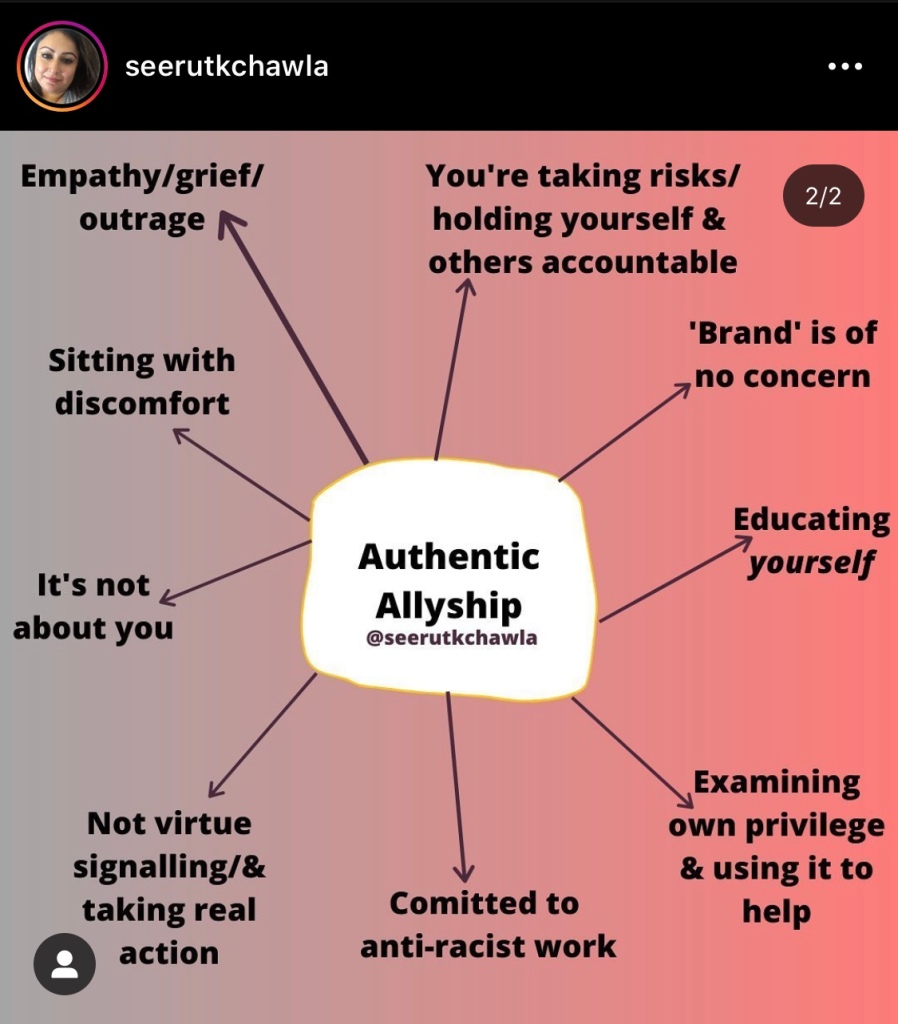
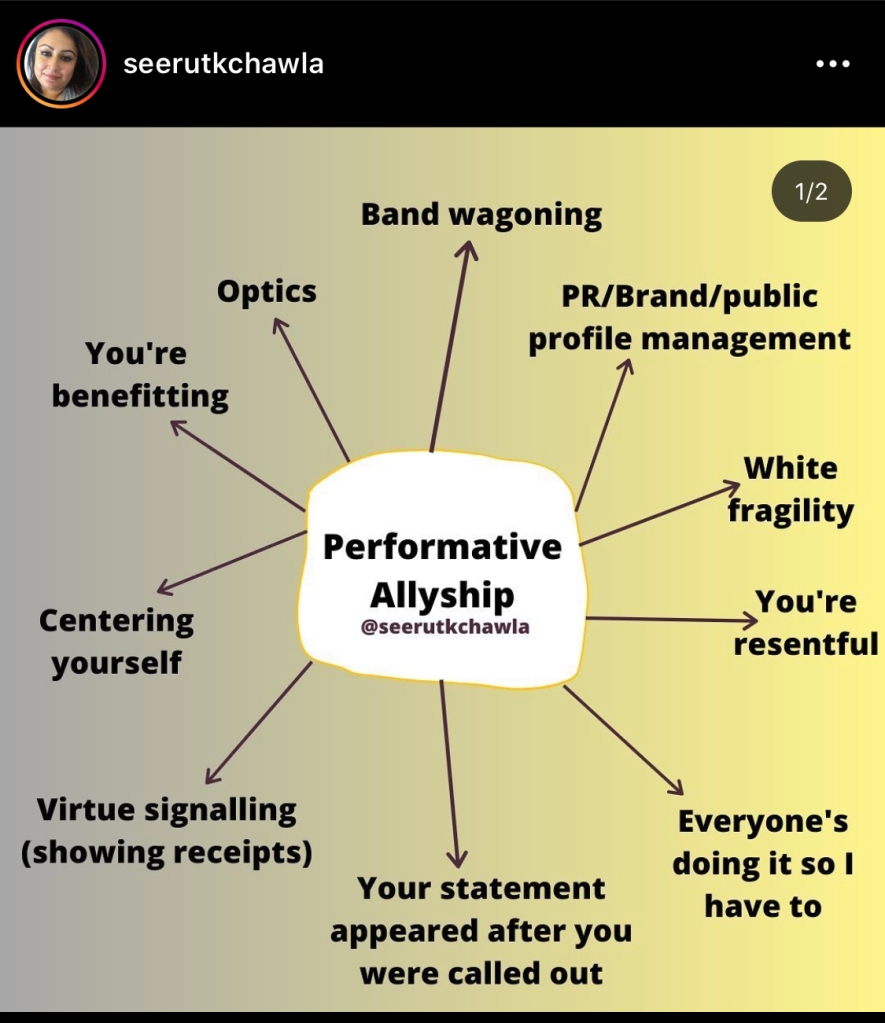
Check in with your people.
- If you are white-identified, check in with other white people to see where they’re at. Hold space for them to be messy and for them to be uncomfortable. Use your privilege to be tolerant of others who are at different stages of racial consciousness. Yeah, it might feel better to unfriend your middle school friend who “does not understand why you’re supporting riots,” but frankly, this is not about your own sense of comfort and curated content. This is the time to dig in your heels, put on the armor afforded by your privilege, and either defend Black folks or help that person understand why they should care about racial justice.
- If you are white-identified, check in with the POC in your lives, especially Black-identified people, and ask how you can support them. That might mean doing absolutely nothing. It might mean being okay with silence coming from the other end. It might mean donating money, giving rides, helping provide PPE for folks in marches, etc. Please offer your support and send your love, because people are hurting right now.
- If you are a non-Black POC, check in with Black-identified folks and help to create, maintain, and safeguard Black-centering spaces. Help to uplift Black voices. Ask how you can support, and, again, be okay with silence on the other end.
- As you reach out and check in, leave space for all of the ways of being. When a bad thing happens in someone’s life, we often default to problem solving and/or wanting to get someone to smile. I get it. It’s hard to watch and empathize with people who are pained. Right now, though, we do not need the reminder of silver linings, rainbows, or bright sides. Toxic positivity does not make us feel better—it does the opposite and perpetuates this idea that the only good way to be is happy. Here’s the thing: the only good way to be is how you are.
Educate yourself.
- It is not the duty of Black folks to explain themselves or this moment to you.
- Recognize that privilege and white supremacy are not just evidenced by the words we use. It is also about behavior, patterns of behavior, and the social value we give to some but not others. For example, if you are at a rally, pay attention to who grabs the microphone and what they have to say. Pay attention to the space white folks and non-Black folks take up whether through their speech or their behavior. Pay attention when a white woman’s tears are met with empathy or care, and when a Black woman’s raised voice and anger are met with eye rolls or pushback (for being “aggressive,” or “too much”). White people have access to so much more social value and acceptable behavior—pay attention to how that can dominate spaces.
- The resources to understand white privilege and the role you can play in anti-racist work are available in many different places. Below there are a list of resources that you can search through.
- Also! You do not need to know everything in order to do this work! Quality, not quantity! Frankly, the best thing you can learn to do is reorient your yourself so that you are open to feedback, open to learning more and/or changing your mind, and not having easy answers (see more on practicing cultural humility). Those paradigms do not come naturally to most people. We are acculturated to feel shame in not knowing and to hold fast to deeply entrenched beliefs, and so this work is difficult.
- There are many ways to support Black lives and do anti-racist work. It’s not always about being in the streets. It’s sometimes about taking the time to have hard conversations with friends and family who are not totally getting it yet. It might be in taking the time to read a book. It might be in journaling and reflecting on how power and privilege come to play in your life. Just like any movement or group effort, it takes as much work as it does rest and reflection.
Are your social media posts effective in creating change? Or are they performative?
- Social media messaging comes easily. It also means little to nothing beyond helping people see that you “care” about a cause. If you want to join in on hashtags and/or social media campaigns, that’s fine, but that should only be auxiliary to all of the work you can do to support Black lives. Those things include all of the recommendations in this blogpost and put more succinctly:
- Donating
- Reading
- Listening
- Contacting government officials and those in elected office
- Always. Be. Critically. Engaged. It can be tempting to retweet, repost, share messaging from others’ making powerful statements—BUT when you’re jumping into the trend, look at the “why” and the “who” of what is being posted.
- Quick killjoy jab: corporations do not care about Black lives right now. They care about where you would like to put your money. Just like with human activists, look at what companies DO and NOT what they SAY.
- For a case study on this, see the origins of #BlackoutTuesday and how far it strayed from the initial campaign by Jamila Thomas and Brianna Agyemang, two black women working in the music industry.
- Ask yourself why you are posting anything at all:
- What purpose is this message serving?
- Who is this message serving?
- Who is the audience?

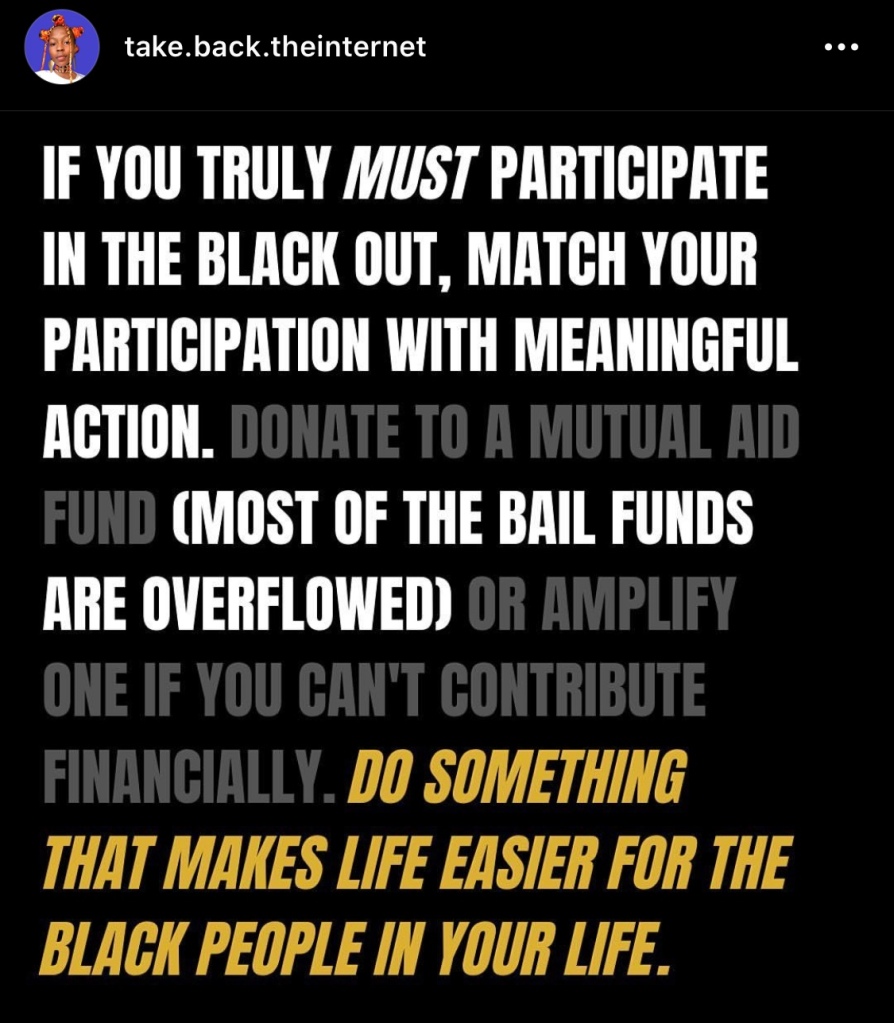
Solidarity is the way.
Quick preface: If you’re reading this blog, you have probably gotten to a place of understanding with the difference between “Black Lives Matter” and “All Lives Matter.” The idea of Black lives mattering does not negate others’ importance. Rather it shines a light on the discrepancy between how certain lives are valued more than others.
- The only way through is together. This is not a feel-good statement—it is a hard truth. My survival is tied to yours and we can only do the radical work of anti-racism by understanding that solidarity is key. This means allying with causes and movements that do not necessarily center your own social identities.
- Deepa Iyer writes about the difference between transactional and transformational solidarity practices. She uses the case study of attending a rally: in transactional solidarity, one would attend a Black Lives Matter rally in support and return home to post pictures from the rally on my social media profiles. In transformational solidarity practice, one brings friends to the rally, learns more about the historical roots of the cause you’re supporting, engages in deep and meaningful dialogue, and shows up to more rallies on and on.
- Transformational solidarity practice stretches the activist and the movement in beneficial ways. The actions taken in this practice have the potential to create meaningful change.
I know that was a lot. If you’ve read to the end here, then you might be feeling many different things. Offended, confused, validated, relieved, upset, guilty–and that’s okay. This is the time and the space for sorting through the discomfort of anti-racist work.
Please know that I write this with as much love (albeit tough) as I can muster. I believe in you.
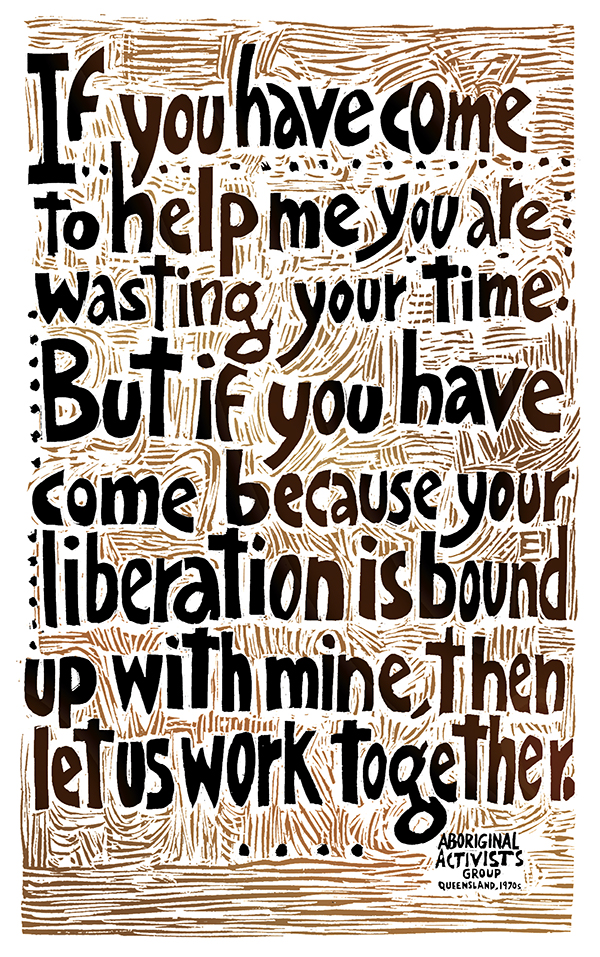
Thank you to the Mosaic Center for curating many parts of the following Resources list in their recent posting on myUMBC. As UMBC’s leaders in helping our communities embrace and affirm diversity and inclusion, the Mosaic Center is more important than ever. The Women’s Center is, as ever, in close partnership and solidarity with the Mosaic, and we will always commit to that. Thank you, Mosaic Team, for all you do to make the UMBC community and our world a better place.
Resources*
* There are a lot of resources below. A lot. This work is not being timed. There is no deadline. This is a marathon, not a sprint. Many folks feel an urgency to read! All! The! Things! And yes, this work is urgent but also must be sustainable. Take breaks. Breathe. Set SMART goals when it comes to reading, learning, and digesting so as not to burn yourself out.
Books:
- So You Want to Talk About Race by Ijeoma Oluo
- Freedom is a Constant Struggle by Angela Davis
- How to be An Anti-Racist by Ibram X. Kendi
- They Can’t Kill Us All : Ferguson, Baltimore, and a New Era in America’s Racial Justice Movement by Wesley Lowry
- The Good Immigrant: 21 Writers Explore What It Means to be Black, Asian, and Minority Ethnic in Britain Today by Nikesh Shukla
- The New Jim Crow: Mass Incarceration in the Age of Colorblindness by Michelle Alexander
- Between the World and Me by Ta-Nehisi Coates
- Your Silence Will Not Protect You by Audre Lorde
- When They Call You A Terrorist by Patrisse Khan-Cullors and Asha Bandele
- Why Are All the Black Kids Sitting Together in the Cafeteria? by Beverly Tatum
- White Fragility by Robin DiAngelo
- BONUS + CAVEAT: What’s Missing from White Fragility by Lauren Michele Jackson
- The Fire Next Time by James Baldwin
- The Fire This Time edited by Jesmyn Ward
- Pedagogy of the Oppressed by Paulo Freire
- Sister Outsider by Audre Lorde
- Me and White Supremacy by Layla F. Saad
- Road Map for Revolutionaries by Elisa Camahort Page, Carolyn Gerin, and Jamia Wilson
- Black Feminist Thought by Patricia Hill Collins
- Eloquent Rage: A Black Feminist Discovers Her Superpower by Brittney Cooper
- The Next American Revolution: Sustainable Activism for the Twenty-First Century by Grace Lee Boggs
- This Bridge Called My Back edited by Cherríe Moraga and Gloria Anzaldúa
- A People’s History of the United States by Howard Zinn
- Teaching to Transgress by bell hooks
Readings:
- The 1619 Project by Nikole Hannah-Jones
- Black People “Loot” Food … White People “Find” Food by Van Jones
- The Case for Reparations by Ta-Nehisi Coates
- White Supremacy Culture by Tema Okun
- Save the Tears: White Woman’s Guide by Tatiana Mac
- When White Women Cry: How White Women’s Tears Oppress Women of Color by Mamta Motwani Accapadi
Podcasts:
- 1619 (New York Times)
- About Race
- Code Switch (NPR)
- Intersectionality Matters! hosted by Kimberlé Crenshaw
- Momentum: A Race Forward Podcast
- Pod For The Cause (from The Leadership Conference on Civil & Human Rights)
- Pod Save the People (Crooked Media)
- Seeing White
Collections:
- Showing Up for Racial Justice (SURJ) Teaching Toolkit
- Anti-Racism Resources Google Doc
- NOTE: I got a lot of the resources shared throughout this post from this Google Doc, and I highly recommend viewing it.
- 75 Things White People Can for Racial Justice
- Justice in June
- NOTE: A flexible syllabus for those who want to become active allies to the Black community. Includes a month of lesson plans that range from 10, 25, and 45 minutes per day.
- Fractured Atlas: Resources for White People to Learn and Talk About Race and Racism
- Black Lives Matter Resources + Toolkits
- Jenna Arnold’s Recommendations
- Black Lives Matter Syllabus
- NOTE: Black Lives Matter Syllabus is the intellectual property of instructor Frank Leon Roberts. This means that material compiled in this syllabus should not be duplicated without proper citation and attribution.
Resources for white parents to raise anti-racist children:
- Books
- Freedom on the Menu: The Greensboro Sit-Ins by Carole Boston Weatherford
- Many Thousand Gone: African Americans from Slavery to Freedom by Virginia Hamilton
- One Crazy Summer by Rita Williams-Garcia
- LIST: Coretta Scott King Book Award Winners: books for children and young adults
- LIST: 31 Children’s books to support conversations on race, racism and resistance
- Podcasts
- Videos
- Follow
UMBC Organizations:
- UMBC Campus Life’s Mosaic, Interfaith, & Pride Centers
- UMBC Black Lives Matter
- UMBC Black Student Union (BSU)
- UMBC African Student Association (ASA)
- UMBC Caribbean Student Council (CSC)
- UMBC Ethiopian Eritrean Student Association (EESA)
- UMBC Curl PWR
- UMBC Queer and Trans People of Color (QTPOC)
- UMBC Black Faculty and Staff Association (BFSA)
- UMBC Chapter of Black & Latino Alumni (CBLA)
More Organizations:
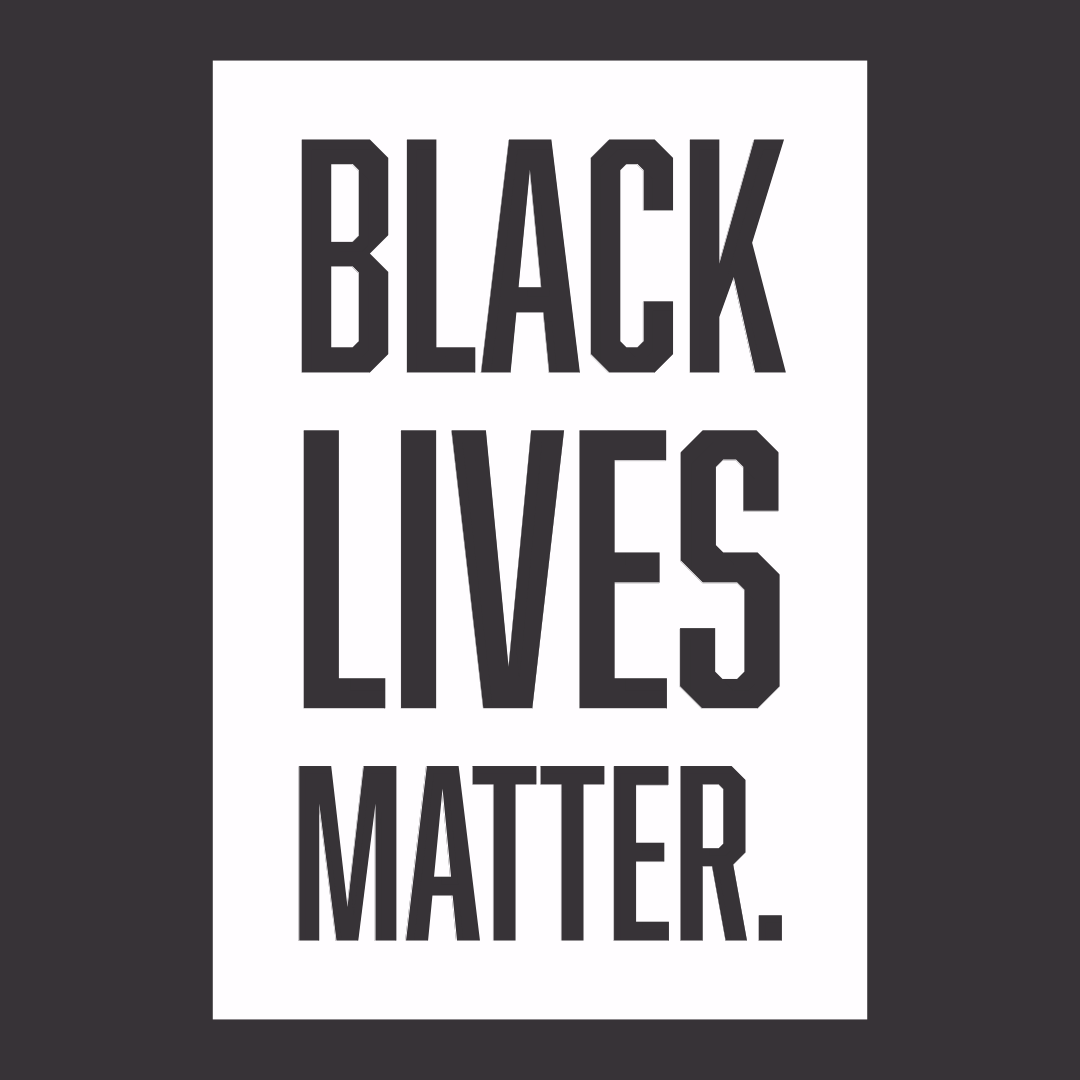
[…] Meman ’15, gender and women’s studies, assistant director of the Women’s Center, wrote an early post on the center’s blog about “calling in white people and non-Black people of color” and providing resources to help […]